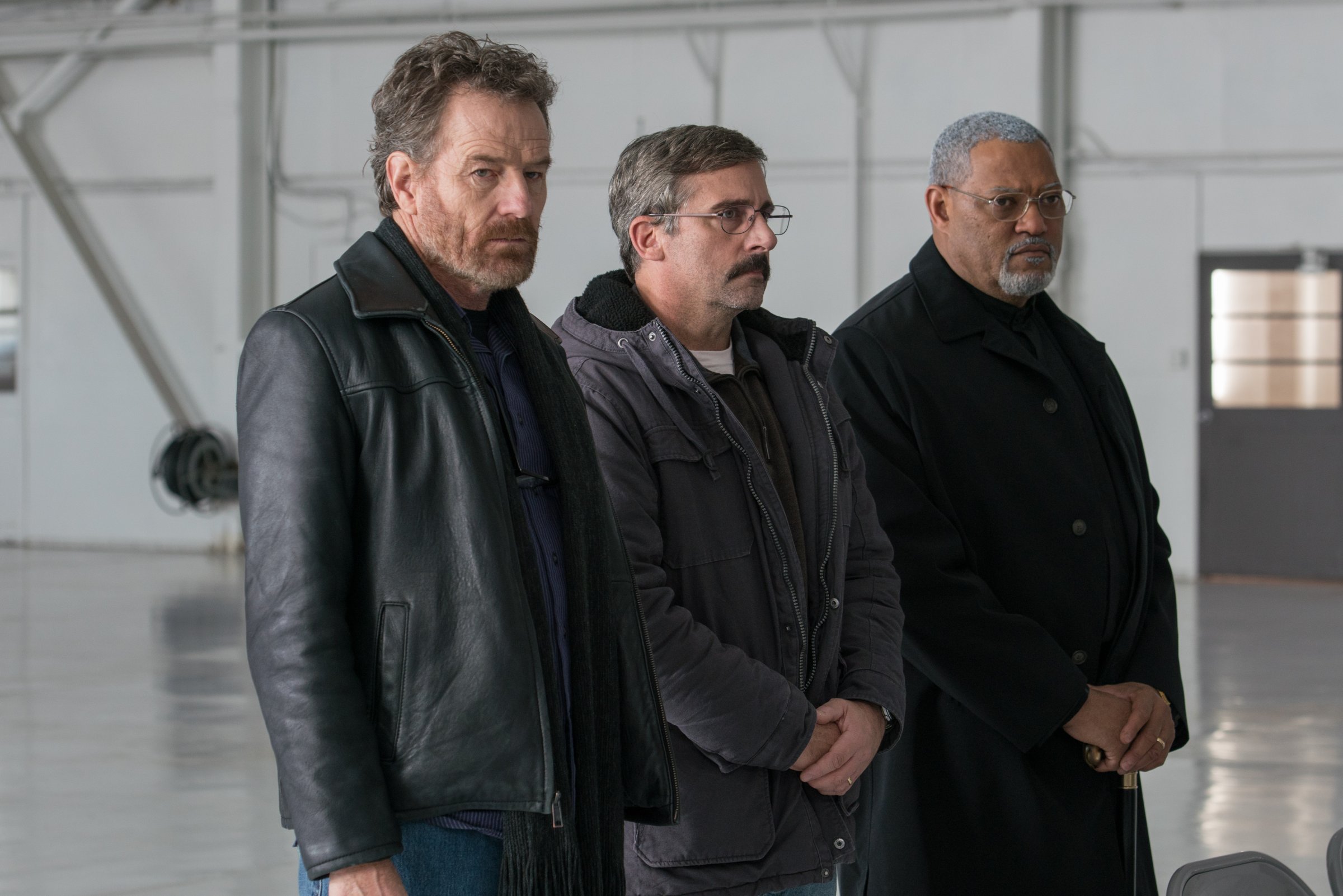
To sink deep into the sound of people talking is one of the great pleasures of a Richard Linklater film. Yet dialogue is the very thing that hobbles Linklater’s latest, Last Flag Flying. Scene by scene, the movie explains, rather than reveals, itself. It almost talks itself into a hole it can’t quite climb out of.
Steve Carell plays Larry “Doc” Shepard, a soft-spoken, decidedly unaggressive Vietnam vet who seeks out two of his old war buddies—Bryan Cranston’s Sal, a feisty, sozzled bar owner, and Laurence Fishburne’s Richard, a respectable minister—for help with a special and particularly painful task. It’s 2003, and Doc’s son, a Marine, has been killed in Baghdad; military brass has told him the young man died heroically in combat. Traveling from his home in Portsmouth, N.H., Doc is headed first to Dover Air Force Base to collect the body, and then to Arlington National Cemetery for the burial. The loss has rattled him so completely—his wife has also died fairly recently—that he finds himself seeking the company of these two friends whom he hasn’t seen in years. He talks them into accompanying him first to the base and then to the cemetery, where he’ll lay his son to rest.
But things don’t quite work out that way. Doc has a change of heart—for reasons that aren’t clear—and decides to bring his son home to be buried near his mother. He wants Sal and Richard to come along. They resist at first, because this reunion hasn’t been easy from the start. Sal won’t let the overtly pious Richard forget that his old nickname used to be “Mueller the Mauler,” a reference to his prowess (or lack thereof) with the ladies in their old days as Marines. Richard is dismayed that Sal, always the first to stir up an argument and usually drunk to boot, doesn’t seem to have matured at all. Doc, a Navy man, is stuck in the middle, forced to referee his friends’ tiffs even in the midst of his grief. He’s certainly the most genial. In the movie’s finest scene, he reminisces about his first visit to a prostitute, arranged by Sal, who was alarmed that his friend had reached age 18 with his virginity intact. “Actually, it wasn’t that bad. It was O.K. It was nice,” he says, reflecting on the event. He pauses, and elaborates: “It was like going to a friend’s house. Then you have sex with the friend. Then you give them money.”
That sequence is loose and sweet and free, motoring along on the kind of dialogue you go to a Richard Linklater movie for. Fans of Linklater’s movies—pictures like Before Sunrise and its two sequels, Before Sunset and Before Midnight, which trace the interior life of one couple (played by Julie Delpy and Ethan Hawke), or the gloriously ramshackle 2016 college-baseball comedy Everybody Wants Some!!—value his gift for using dialogue to capture the mood and rhythm of a specific place, time or situation. What he does is less like screenwriting and more like eavesdropping on his characters.
But Last Flag Flying—even though it ultimately lands on a graceful, moving note—has little of that seemingly paradoxical freewheeling specificity. Instead, it’s been carefully crafted to make its all-too-obvious points. The script is by Linklater and Darryl Ponicsan, adapted from Ponicsan’s 2005 novel of the same name. (That novel is a sequel to Ponicsan’s 1970 The Last Detail, which was filmed by Hal Ashby in 1973, with Jack Nicholson, Otis Young and Randy Quaid in the three key roles.)
Last Flag Flying gives its characters plenty of chances to reflect loudly on the futility and madness of war. Yet somehow, even though all three are former military men themselves, the movie doesn’t seem to have much understanding of how those on the front lines think; in particular, these characters’ definition of heroism is bizarrely narrow. In the end, after seemingly forever, they reach an epiphany that makes sense. But as men who put their own lives on the line for their country—even as they were fighting for a cause they didn’t really believe in—for most of the movie they come off as weirdly out of touch with the hard bargains that military service entails. It’s as if, instead of having gone to war themselves, they’d just seen lots of movies about it. And that’s already a pretty crowded boat.
More Must-Reads from TIME
- Why Trump’s Message Worked on Latino Men
- What Trump’s Win Could Mean for Housing
- The 100 Must-Read Books of 2024
- Sleep Doctors Share the 1 Tip That’s Changed Their Lives
- Column: Let’s Bring Back Romance
- What It’s Like to Have Long COVID As a Kid
- FX’s Say Nothing Is the Must-Watch Political Thriller of 2024
- Merle Bombardieri Is Helping People Make the Baby Decision
Contact us at letters@time.com